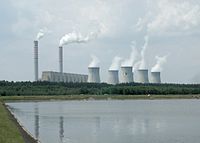Fossil-fuel power station

A fossil-fuel power station is kind of like a big machine that creates electricity so that people can use it for different things like turning on lights or watching TV.
To make electricity, the power station needs energy. In a fossil-fuel power station, the energy comes from fossil fuels. These are things like coal, oil, and natural gas that are dug out of the ground.
Once the fossil fuels are brought to the power station, they are burned using fire to create heat. This heat then converts water into steam, which powers a machine called a turbine. The turbine spins a generator, which creates electricity.
The electricity produced at the power station is then sent through power lines to homes, schools, and other places where people need electricity to use their appliances and devices.
However, burning fossil fuels can also cause pollution and harm the environment by releasing gases into the air that contribute to climate change.
Overall, fossil-fuel power stations are a way for people to access electricity, but there are also concerns about the impact they have on the environment.
To make electricity, the power station needs energy. In a fossil-fuel power station, the energy comes from fossil fuels. These are things like coal, oil, and natural gas that are dug out of the ground.
Once the fossil fuels are brought to the power station, they are burned using fire to create heat. This heat then converts water into steam, which powers a machine called a turbine. The turbine spins a generator, which creates electricity.
The electricity produced at the power station is then sent through power lines to homes, schools, and other places where people need electricity to use their appliances and devices.
However, burning fossil fuels can also cause pollution and harm the environment by releasing gases into the air that contribute to climate change.
Overall, fossil-fuel power stations are a way for people to access electricity, but there are also concerns about the impact they have on the environment.
Related topics others have asked about:
